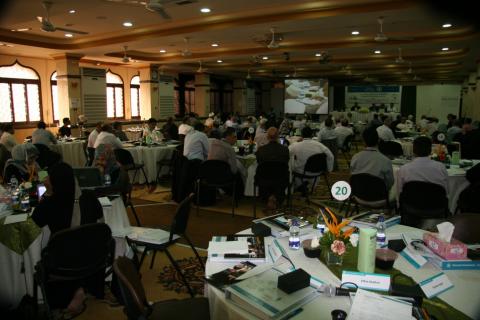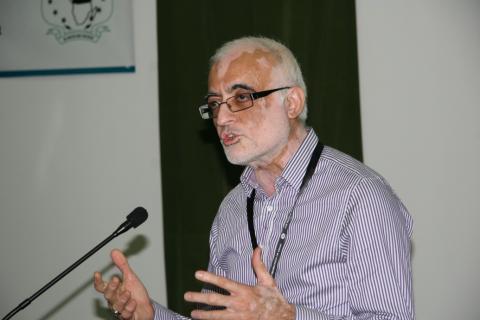
REFLECTION & RECITATION FROM THE HOLY QUR’AN (MORNING)
Sayyid Aliraza Naqvi delivered the morning reflection on Consensus Building and Shura.
Consulting others was a practice of the Holy Prophet (saw). He taught the Muslims to follow it in their own daily lives. Through this practice, the Prophet (saw) nurtured higher level thinking among the Muslims, teaching them that they could also contribute to the running of the affairs in the Muslim society.
Sayyid Aliraza went on to say that cooperating with others in goodness is one of the basic rules for a Muslim society. When believers work together there is motivation, enthusiasm and a rise in spirit. Along with that, there is Divine help and blessings in the deed. Each believer feels encouraged by the response of the other, and in this way a spark of goodness can become a great light. The light then engulfs society, its beams reflect on various aspects of the members’ lives.
Sayyid Aliraza stated that consulting others and taking their opinions reveals a level of trust and respect for them. The practice of consulting others has many benefits – it stimulates thought, enhances self-esteem, strengthens relationships and binds society together.
Sayyid Aliraza ended the reflection by asking the participants to “start the day’s deliberations by standing and paying allegiance to the Imam of our time (ajfs) by committing to him that we will do our best to uphold the true values of Islam and that we will keep our mission focussed to serve Allah (swt). He went on to say that we will be polite and considerate to others, we will be sincere in our intentions and we will have no personal agendas but that which is best for our people.” A prayer was recited on behalf of all of the participants.
SECRETARIAL REPORTS
The Assistant Secretary Generals of the five departments of The World Federation presented their reports at the 14th Triennial Conference in Dar es Salaam, Tanzania. These are as follows:
-
Education – Mahmood Dhalla
-
Islamic Education – Sayyid Aliraza Naqvi
-
Health – Dr Munir Datoo
-
International Relief and Development – Anisa Kanji
-
Zainabiya Child Sponsorship Scheme – Masum Somji
Each presentation discussed the achievements of the term, the challenges faced as well as the recommendations for the next term.
MADRASAH CENTRE OF EXCELLENCE


The Manager of the Madrasah Centre of Excellence (MCE), Naushad Mehrali delivered the presentation on the achievements of MCE over the past three years.
MCE is structured to meet the challenges of the Madaris worldwide. MCE has achieved some key accomplishments which include:
1.
MCE has invested many resources and a lot of time into developing the following exciting areas of learning:
-
Neuropsychology of learning
-
Spirituality of learning
-
Accredited teacher support programme
2.
MCE has launched its new website: www.madrasahonline.org
3.
Assessment and Evaluation Programme - 106 assessors have been trained throughout the world
Naushad concluded by saying that MCE will now need to increase its work in non-English speaking communities.
REPORT FROM THE ELECTORAL COMMISSION ON THE RUNNING OF 2014 PRESIDENTIAL ELECTIONS
The World Federation Electoral Commission, Sayyid Hasan Naqvi delivered the report on behalf of the Electoral Commissioners. He explained that only one nomination for the position of President was received. He confirmed that Dr. Asgar Moledina has been declared as President of The World Federation of KSIMC for the term 2014 to 2017.
REFLECTION & RECITATION FROM THE HOLY QUR’AN (AFTERNOON)
Shaykh Safder Jaffer delivered the afternoon reflection which focussed on ‘Social Responsibility’. As servants of God, we have a responsibility to show concern and care for human beings. He cited a number of examples which show that Islam is both concerned with individual worship of Allah, as well as collective social responsibilities.
The key message of this reflection was that leaders should realise that their social responsibility is not only to the current generation but should be perpetual for the forthcoming generations as well. In particular he spoke about the ‘Waqf’ (endowment) concept that can be endowed to further good works after a person dies.
MULLA ASGHER MEMORIAL LIBRARY AND RESOURCE CENTRE (MARC)
Hasnain bhai Walji spoke about the achievements of the Mulla Asgher Memorial Library and Resource Centre (MARC) which is based in the Bathurst Centre of Toronto. He explained that there have been a number of important branches in which MARC has made progress:
-
Islamic propagation
-
Interfaith activities
-
Khoja heritage
The Conference viewed a short trailer of the much-anticipated independent movie on ‘Khojas: A Journey of Faith’. Conference participants will be shown the full 2 hour screening of this movie on Sunday 18 May 2014.
Hasnain bhai offered a special thank you to The World Federation, ISI Jamaat of Toronto, NASIMCO, and the donors of this project for their wonderful support of MARC.
REVIEW OF 2006 RESOLUTION – DELINEATING AND DEMARKING THE ROLES AND RESPONSIBILITIES OF THE WORLD FEDERATION AND REGIONAL FEDERATIONS
The World Federation Executive Councillor, Shabbar Dhalla presented a paper on ‘Delineating and Demarking the Roles and Responsibilities of The World Federation and Regional Federations’ for discussion only. He began by outlining the history of the structure of The World Federation’s boards, desks and departments. He mentioned that different structures were fit for purpose for their particular times and contexts.
However, Shabbar suggested that it was once again a time for review of the structure of how the work is delivered and undertaken, and how a true partnership with Regional Federations can flourish and develop.
The paper suggests an inter-federation approach where each department will be made up of a team consisting of The World Federation and regional team members, and the accountability for each project is thus shared. It was agreed the paper would be fully reviewed by the regional federations, and then adopted at subsequent Executive Council meetings.



